|
Introduction by Jim Liddane
Lionel Bart, born Lionel Begleiter in London's East End in 1930, is one of Britain's songwriting greats.
With no formal musical training, he conquered Tin Pan Alley, the
pop charts, the West End theatre, Broadway, and then Hollywood
in a whirlwind spell of creativity that began in the mid-50's.
His hit songs, mostly written alone, included Tommy Steele's "Rock With The Caveman", "Handful Of Songs" and "Little White Bull"; Cliff Richard's "Living Doll"; Tony Newley's "Do You Mind?"; Matt Monro's "From Russia With Love"; and Shirley Bassey's classic "As Long As He Needs Me".
His hit shows included: "Fings Ain't Wot They Used T'Be", "Lock Up Your Daughters", "Blitz", "Maggie May" and blockbusting "Oliver".
And when Hollywood got hold of the last-named, a shower of Oscar nominations resulted.
But with the fame and fortune, trouble came, too. Lionel Bart was badly advised, didn't understand what he was signing, and got ripped off. On his own admission, he spent money like water, developed an extravagant lifestyle and started to believe his own publicity. His 1965 show, "Twang", was a flop and he blew his future film chances by trying to beat the Hollywood system. He was declared bankrupt.
But in 1985, ten years after his discharge from bankruptcy, he received a double boost. Firstly, Cliff Richard teamed up with the riotous comedy troupe, The Young Ones, and put "Living Doll" back in the number one chart position (albeit for charitable purposes). And then BASCA handed him The Jimmy Kennedy Award, a special lvor Novello Award to recognise a special contribution to British songwriting.
Gerald Mahlowe interviewed Lionel Bart for the International Songwriters Association's publication "Songwriter Magazine".
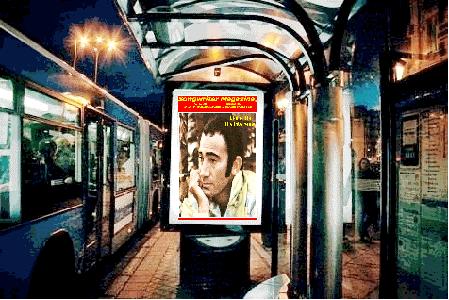
How did it feel to be at Number 1 again?
Well, it was nice! We did it for about three weeks this time! It was very nice inasmuch as I'd given up the game, more or less. I've got four shows in the can, but for the last ten years, I haven't really been writing.
It's been an encouragement?
Oh yes. I'm starting work again, although I'd planned to, anyway, even if all this hadn't happened.
How much did you know about what Comic Relief (the charity who organised the re-recording of "Living Doll") were going to do, in advance?
I got a phone call from the publishers, EMI, and they said would I like to do this, and I said yes. And then I got a letter from Rowan Atkinson (comedy performer and Comic Relief organiser) and I agreed to give up my royalties. As far as I was concerned, it was a charitable affair and I thought nothing more of it.
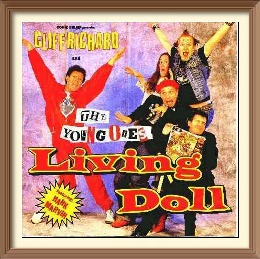
Can you remember writing "Living Doll" originally?
Oh yes, I can.
How long did it take?
Not long at all - just about ten minutes. I was asked to do the score for a film called 'Serious Charge" with Cliff (Richard). And I saw him perform just once, then went down to his home in Cheshunt, met his Mum, and I wrote these songs for Cliff to sing in the film. The 'Living Doll" song itself - one Sunday morning, I was looking at the 'Sunday Mirror', I think, and I saw this advertisement for a doll that did everything. And I thought, "That'll do". It's really just a jingle.
But then while the film was being edited, Cliff got away in the charts with another song, somebody else's, and for whatever reason, the record company didn't want the songs from the film to come out. In fact, on the records that Cliff released before the film came out, certain songs were put in... there was one song, for instance, put on the flip ('B') side of a single, called "Livin' Lovin' Doll"!! I mean, they really tried to stop the songs in that film.
But when the film came out, public demand from Cliffs fans was such that they had to release an E.P. of the four songs from the film, and it was the first E.P. into the Top 20, into the charts. And public demand was such that a few weeks later, they had to put "Living Doll" out as a single, so it went into the charts again. So it's really been in three times, not twice! The song kind of happened in spite of the industry - the public made that song. And it's kind of funny, because EMI have now dusted down all my old catalogue, and I think they're going to try and get some other covers on some of the other songs I wrote at that time.
If that hadn't been for charity, is it a song you would have earned royalties from? Because there are some of your songs, I understand, that you had to give away the rights to, for financial reasons.
I gave away the mechanicals (mechanical royalties) on my show "Oliver"...
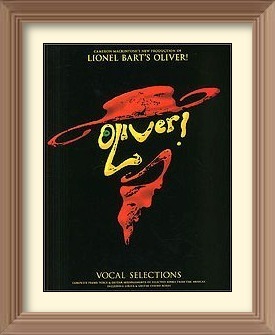
The mechanical royalties only?
Yes. And my other scores and songs were not given away, but there's been a lot of neglect on my affairs over the many years. I've only just started to sort them out A lot of my work is scattered around several publishers, like United Artists and Columbia. It's scattered around a great deal, and my own publishing house, Apollo Music, seems to be scattered elsewhere, and for all I know, those mechanicals may be being kept somewhere.
But you've got to understand that I totally dropped my business affairs and I more or less stopped working. It's only over the last couple of years that I've been sorting myself out, and this year I know where I'm going. But I've always earned money, I still get royalties - that's how I've lived over the last fifteen years. I suppose that now I'm taking an interest in my affairs, I'm going to go into all the neglect there has been, and while I don't realish the idea of huge litigation, if it comes to that - fine.
In between the two appearances of "Living Doll" at number one, have you stayed in touch with the charts?
Well not as much as I used to. If course, before I started writing for the theatre, I was very involved with the charts, I was in the Top 10 for three years. But then it was kind of possible to study the market and what was required generally, what I felt was required. I could deal with artists in terms of what they'd had as their previous record and what they needed for their next one, kind of like writing for a character in a show.
You were involved with all the major male British pop stars of the time - the heavyweight talents, people who've developed and lasted. Like Tommy Steele, Cliff Richard, Joe Brown, Anthony Newley, Matt Monroe...
And Georgie Fame, initially. Although I didn't write for him, I sort of helped him get started. And Adam Faith, of course...
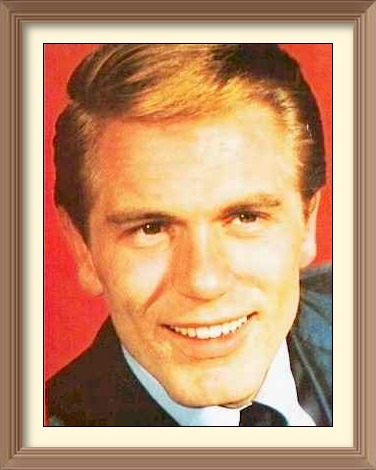
Adam Faith
You didn't write any hits for Adam Faith, did you?
Yes, I had a hit with him. I wrote for a Peter Sellers film called "When Johnny Comes Marching Home". Then I wrote a kind of ballad song for him, which got to about Number 3, a thing called "Easy Going Me". And then he did a great cover on one of the songs from "Fings Ain't Wot They Used T'Be", a song called "Big Time". Adam's thing was - the terrific thing - he couldn't really sing. The whole appeal of his throwaway delivery was that people listening to it, kids listening to it, said, "Well I can sing as well as that!". And this is a great attribute. But he's a very fine actor.
Have you kept in touch with the pop stars you wrote for?
To some degree.
How about Cliff?
No - to my loss, I haven't. Let's face it, we had different lifestyles. I was living dangerously and pretty close to the flame, while Cliff was a good boy! But do have some very close friends that I've had all these years. I'm very close with Justin Hayward of The Moody Blues - he and his wife lived with me two years before they were married. I'm still very closely in touch with Donovan, who's back in England now...
How would you demonstrate songs to people like Cliff and Adam?
I would basically demo them myself. Of course, I can't sing, but I can sell a song, the simple idea of the song and perhaps the simple idea of the way it should be played. And really, my demos were successful because anyone hearing them would say, "I can do better than that!" Surely that's the object of a demo - to inspire somebody to want to do it! On that basis, my demos worked.
I'd like to talk now about the Jimmy Kennedy Award you've been given. Did you know about it in advance of the Awards ceremony?
I didn't know at all. I went with EMI, with Kay O'Dwyer (EMI executive) and the lawyers and accountants. I haven't been to one of those occasions for many years, although I had a lot of awards in the 60's. But I kind of had an inkling that something was odd when they wanted to send a car for me - but when I got there, there was no fuss from the photographers, or anything, and I thought, "Well, there's nothing going on. I'm just here to watch some friends get awards."
And when my music came on, and the visual display of my face as a youth! ... even then I didn't realise I was getting a special award. And then I got this standing ovation - it was very touching.
There was this huge spectrum of composers there - Malcolm Arnold, Paul Hardcastle, Elton John, Eric Clapton - and all I could think of to say was, "Well I guess I must deserve it!" And I wasn't being flash or anything - I said it because I literally meant it Then when Malcolm Arnold came up to Ine and said he knew all my work, I was flabbergasted. I was very touched by the whole thing.

Jimmy Kennedy
Is Jimmy Kennedy someone you knew?
Yes, not a lot, but a bit. I did run into him in the old Tin Pan Alley days - he was a very good man.
Can we turn to the theatre now? You said right at the start of our interview that you had four shows in the can. Can you tell us a little more about those?
I've got an opera about The Hunchback of Notre Dame, called "Quasimodo"...
That's quite an old project, isn't it?
Yes I wrote "Quasimodo" in 1967, I wrote "La Strada" in 1968/69, I wrote "Gulliver's Travels" in 1969/70...
Those are all before you were discharged from bankruptcy in 1976?
Yes, but the other one I did with Roger Cook much later, probably about 1978. That's "Golda", based on the life of Golda Meir, which I'm in the process of doing a deal for. They're doing a musical of it, based on some of my material, but I don't want to be involved in it.
Are these shows demoed?
Yes. The one for "La Strada" is very full-scale, with an orchestra, and it was done for American backers and they wanted a very posh demo. But normally when I've done a show, I've gone in myself for the first half a day and sung all the songs with just the rhythm section. Then I've just had mates come in, listen to me on the cans, then sing over the top - they couldn't wait to throw me away on the cans! Now the fact that the mates were Justin Hayward, Elton John, Madeleine Bell, the Beatles ... that's beside the point!
The thing is we didn't have time for more than perhaps one or two takes on each item, but the results of some of those demos were as good, if not better, than you could get if you really went for it! I didn't try to make the songs come out of context, by the way; they really were demos for the show.

Norman Newell with Lionel Bart
[Picture courtesy PPS]
Why have the three earlier projects proved abortive?
Well firstly, I did them on a very large scale visually, with the designer Sean Kenny, and when he died, I couldn't envisage doing them with any other designer, because they were really huge. If one was to do them today, they'd cost a great deal more than "Chess" or "Time".
That was one factor. Another factor was problems with producers and publishers. I really got fed up with it all. So many people claimed to own what I wrote. One mad publisher said, "You can't even write a couplet without me owning it - even before you write it!" All these people - the bent managers I'd had and these publishers I was getting involved with - they were basically accountants. The nearest they got to music was fiddling the books! I just really went on strike.
Do you go to the theatre much? Do you try to keep tabs on the musicals in particular? Have you been to see "Time"?
I had two tickets for the opening but I haven't been to see it.
They say the sets, visually, are staggering. Bearing in mind what you said about the scale of your unproduced shows, you ought to like it!
Well, whilst I do think visually, I think characters and plot are very important, too! And I think melody is very important.! guess that is a heritage from music hall for me.
! really believe that people want to remember music, remember tunes. I don't think it's sufficient just to have a one-song show. It seems to me that that is almost the aim, these days, to have just one song in a show that's retentive!
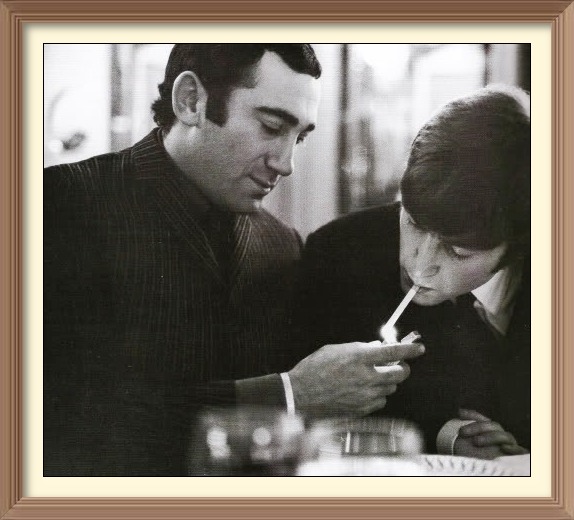
Lionel Bart and John Lennon
[Picture courtesy Lionel Bart]
What do you think of Stephen Sondheim?
I admire Stephen Sondheim immensely. He has great theatrical flair and he's a great lyric writer - albeit sometimes I can smell the rhyming dictionary! But that's all right!
Do you have an absolute favourite songwriter?
My favourite lyric writer is Lorenz Hart and of course, my influences were W.S. Gilbert and Noel Coward, to a great degree.
I'm sure you once wrote a song for the Eurovision Song Contest! I'm talking about a lovely song called "Choose", which I had on a record by Sammy Davis Jr., but I'm sure it was originally done by Matt Monro for Eurovision!
You're right! I was asked to do Eurovision way back. And my Dad, bless him - he's not alive today - but he said, "Lionel - don't enter no competitions, because you can lose!" But it came up that Matt Monro was going to sing all the British contenders, and I'd done the lyrics for "From Russia With Love" for him, and I thought, "Ok - let's go for it". But I'd totally forgotten that Sammy Davis had covered it.
In those days, they commissioned Eurovision songs from the top British writers?
That's right. I don't know much about Eurovision today. Most of them sound as if they've been produced by computer - and I'm not just talking about synthesisers, I mean the general structure of the melodies. But there's some good things come out of it, in spite of all that. The Abba thing was, I think, sensational. Their record production was so good. And then they became the second largest industry in Sweden!
Your technique - has it changed at all over the years?
No.! still sing and I still get behind the person or the character I'm writing for, and if there's no musicians around, I just use my same old one finger at the piano! It's funny you should ask whether my technique has changed because I'm having some lessons at the moment in basic computer, and I am interested in some of the things a synthesiser can do.
I'm not going to say it's going to be my main tool, but I certainly wouldn't pooh-pooh the use of it. Out of my huge family, it turns out that one of my nephews is a very good key-board player and writer - he's about 23 - and he took me into a studio with just one engineer and one keyboard guy and all this incredible equipment. They were talking a foreign language! I felt like Rip Van Winkle in a space capsule. I really did! Well, I don't think I could ever get as good as those kids are, but basically I found that if I levelled with them, and just sang what I'd got in my head, we could communicate.

Lionel Bart with Ron Moody
[Picture courtesy PPS]
A lot of writers of great standard songs - particularly Americans - pour cold water on the word 'inspiration'. They say it's a 'craft'. Would you yourself use the word 'inspiration' about your songwriting?
Yes I would, definitely. And the inspiration could be someone else's enthusiasm on an idea, or it could be a bird singing, or it could be an ambulance siren ... anything could be an inspiration. And I would once have poohpoohed inspiration, but I have to remember that there have been times in my life when it was as though something else was helping me.
For instance, when I was doing "Lock Up Your Daughters", I was writing these Restoration lyrics (to Laurie Johnson's music) in the language and approach of that period, yet I'd had no scholarship of English at all.
Perhaps I thought it was instinct or I'd lived it in a previous life! But I've had that on a number of occasions and have to now accept the fact that - call it God or inspiration or whatever you like - it's there. Certainly you have to apply it; and sometimes you have to get a blank piece of paper and start something... but it's there.
And your hopes for the future?
I feel good with myself today and I just have to go with what I've got now. These last ten years have been very strange, let me tell you, but you've caught me on the upturn, as it were, and although I don't know exactly what's going to emerge, I'm quite looking forward to it.
Copyright Songwriter Magazine, International Songwriters Association & Gerald Mahlowe: All Rights Reserved
Postscript
Since 1967, we have spoken with hundreds of songwriters and music publishers, building up a huge collection of detailed interviews which is unmatched anywhere.
Click
HERE to see a list of those currently on this website. And remember, we add new ones every month!
ISA • International Songwriters Association (1967)
internationalsongwriters@gmail.com

Cookies Policy • Privacy Policy • Copyright
Legal Notice
This site is published by the International Songwriters Association, and will introduce you to the world of songwriting. It will explain music business terms and help you understand the business concepts that you should be familiar with, thus enabling you to ask more pertinent questions when you meet with your accountant/CPA or solicitor/lawyer.
However, although this website includes information about legal issues and legal developments as well as accounting issues and accounting developments, it is not meant to be a replacement for professional advice. Such materials are for informational purposes only and may not reflect the most current legal/accounting developments.
Every effort has been made to make this site as complete and as accurate as possible, but no warranty or fitness is implied. The information provided is on an "as is" basis and the author(s) and the publisher shall have neither liability nor responsibility to any person or entity with respect to any loss or damages arising from the information contained on this site. No steps should be taken without seeking competent legal and/or accounting advice
Home •
Interviews •
Writing A Song •
Obituaries
|